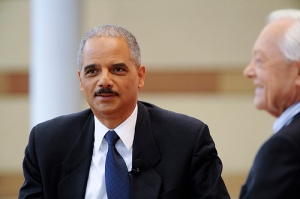The emails have also revealed the close attention Stratfor has been paying to Wikileaks and the company’s involvement in attempting to convict Assange. In June 2010, Fred Burton wrote the following email:
Is he an Aussie?
As a foreign national, we could revoke his travel status and deport.
Could also be taken into custody as a material witness.
We COULD have a sealed indictment and lock him up. Depends upon how far
along the military case is.
Again the email raises obvious interrogations as to what the implications of Stratfor were on the Grand Jury and this mysterious indictment. In an email from December 12th 2010, while Julian Assange was in Wandsworth prison, Fred Burton sent an email announcing that he had informed Sky News of his “concerns for US extradition.” Five days before Fred Burton, responding to a chain of emails on getting Assange arrested had written:
Will take weeks for extradition, unless he waves the process. DOJ [Department of Justice] (Holder) won’t seek prosecution on their own, but look for the GOP (Congress) to press for criminal prosecution. Be easy to indict. I would pursue Conspiracy and Political Terrorism charges and declassify the death of a source someone which I could link to Wiki.
That chain of emails reveals the “brain storming” undertaken to hamper Wikileaks’ work. In that same chain Burton wrote:
One other point is this. Ferreting out his confederates is also key. Find out what other disgruntled rogues inside the tent or outside. Pile on. Move him from country to country to face various charges for the next 25 years. But, seize everything he and his family own, to include every person linked to Wiki.
Sean Noonan was an analyst who seemed to have a central position in the discussion regarding Julian Assange’s. According to him
All this trouble with internet hosting could serve to slow down this set of leaks. And maybe a combination of wikileaks arrest and server shutdowns could stop it.
Different ways to pressure Wikileaks and whether the organization would outlive Julian Assange were discussed:
Yes, like Fred’s source pointed out–arrest and trial would just be a political circus. It would probably not disrupt wikileaks. BUT, occasionally a leader makes an organization, and maybe no one as capable will be willing to fill his shoes. Or at least, won’t be able to get as much publicity for wikileaks. As you also said, it could tarnish both Assange’s and Wikileaks’ repution. That could serve to discredit and undermine the group. Maybe people would be less inclined to leak to it, or the public would be less inclined to pay attention–or more importantly support wikileaks financially. Though I admit the chance of this causing the public to pay less attention is minimal, and in fact would probably increase attention on the guy. (though personally, getting a rapist off the street is getting a rapist off the street. Also, his mom owns a puppet theater…)
If Assange is running the show and his staff isn’t as confident as he is, then arresting him now could very well stop the flow of cables. But all it takes is one person to keep it going – or just dump them all at once if it gets too dicey, and these files have been very widely distributed so far. I can’t imagine anyone reclaiming all the documents now.
In a different chain of emails, Burton explains:
The espionage laws, believe it or not, do not make an exception for
reporters, Martin says. However, as a matter of policy, reporters and publishers have never been charged under espionage laws.
To which Sean Noonan replies:
This seems like a pretty good analysis. Certainly better than most of
our own conjecture. ‘Given that Assange has run hundreds of thousands of classified documents on his web site, each one that is properly classified could be included as
a separate count of an indictment.’ I look forward to Manning and Assange facing a bajillion-thousand counts of espionage.
A privately owned intelligence agency, Stratfor seems to reflect the issue of all secret services: its obscure interferences with the rest of society and the legal system in this context.

